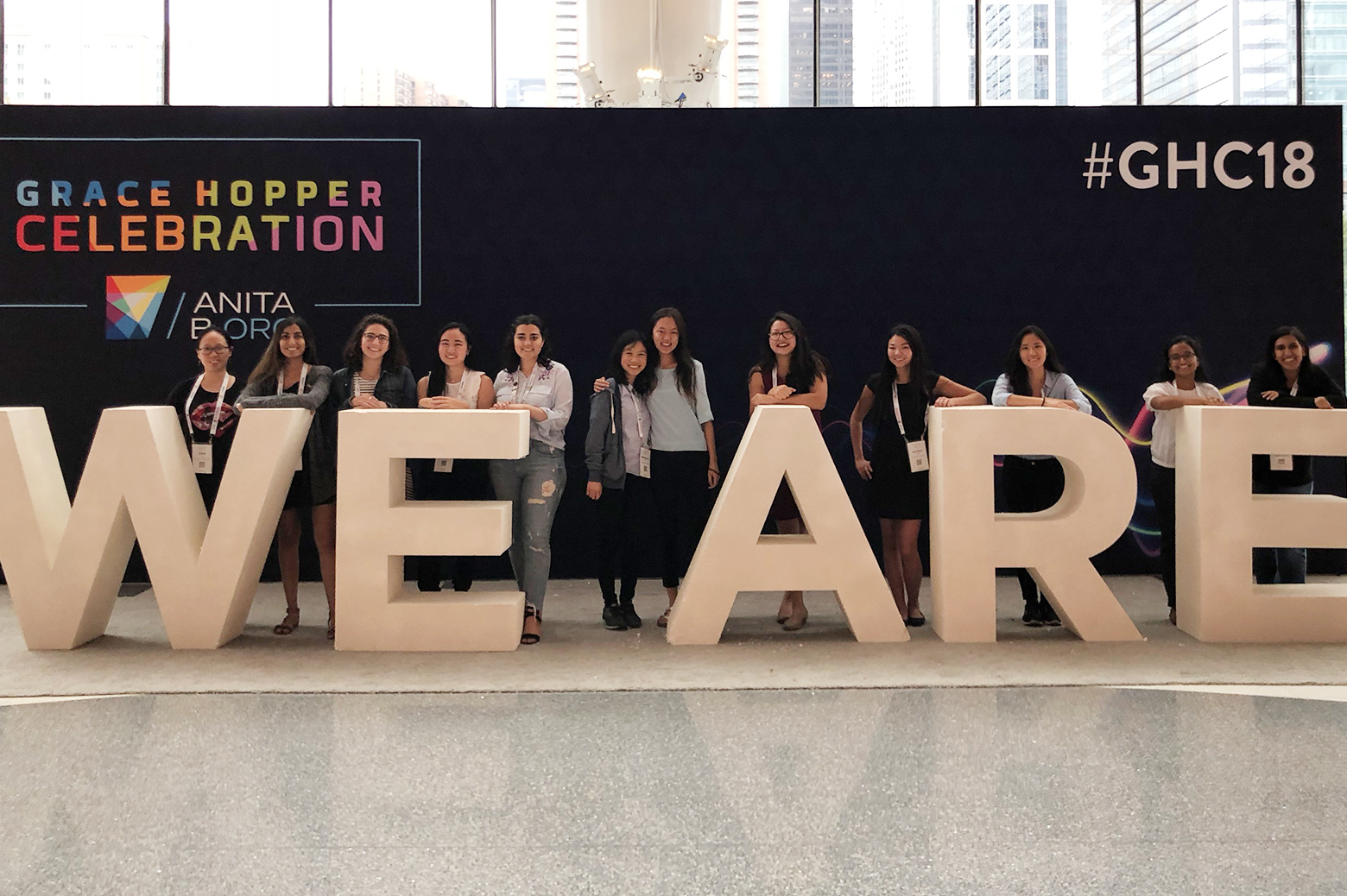Students celebrate women in computing at Grace Hopper
“When you constantly feel like you’re a minority, it is reassuring to attend events like GHC to remind you that you are not alone.”

 Enlarge
Enlarge
18 women in CSE stood among nearly 20,000 at this year’s Grace Hopper Celebration of Women in Computing, the world’s largest gathering of women technologists, which is offered by AnitaB.org and the Association for Computing Machinery. Grads and undergrads traveled to the conference for career opportunities and presentations by women who hold lead positions across academia and industry.
The Grace Hopper Celebration is designed to bring the research and career interests of women in computing to the forefront. Like other conferences of this scale, it features a massive career fair, resume database service, and on-the-spot interviews with prominent tech companies. Researchers give presentations from technical fields broad and niche, and attendees have the chance to connect personally with like-minded experts. But unlike other conferences of this scale, the spotlight is on women.
“At another large conference I went to, I had to actively seek out female presenters that I wanted to go see,” says Zi Yang, a senior who attended for the first time. “Here it was not even something that I had to think about.”
This was the first large conference experience for many of the students in attendance, who were motivated by the chance to learn about advancements in tech and listen to impactful talks. The roster for this year’s conference included keynotes by Priscilla Chan, philanthropist and co-founder of the Chan-Zuckerberg Foundation, Anita Hill, attorney and professor of social policy at Brandeis University, and talks by executives, deans, founders, award-winners, and activists.
“It was a really nice change of pace because that’s not the kind of environment that you live in if you’re a woman in tech right now, especially in class,” Yang says. “Being alone or lonely in this space means not having project partners who are female, or looking around in class and realizing that the people who are raising their hands and speaking up are all male.”
Other participants were moved by the chance to attend an event designed with the position of women in the industry in mind.
“When you constantly feel like you’re a minority, it is reassuring to attend events like GHC to remind you that you are not alone,” says masters student Lakshmi Ashok. “It shows you that you are no less than any of your peers and that you are equally capable.”
The opportunities for career advancement were beneficial to grads and undergrads alike. Yang made use of the event’s resume database to secure an interview with Google for an opening she says she would never have heard of or thought to look for otherwise. PhD student Mimansa Jaiswal wasn’t interested in immediate industry job openings, but had the chance to meet at length with researchers whose work she has long followed and got access to different company research branches she never had at other conferences.
“There are surprisingly many female researchers in my field who were there,” says Jaiswal. “I personally talked to around 12 of them for an hour each, which is time they generally could not afford to give you.”
Jaiswal studies affective computing, which works to understand and simulate human behavior. Thanks to her time spent at company after-parties and her niche interests at the career fair booths, she had rare access to the research divisions of companies like Facebook or Amazon Alexa.
“I could talk to very specific people in speech processing and natural language understanding working in research divisions,” she says.
The trip was supported and organized in part by the CSE division and Girls in Electrical Engineering and Computer Science (GEECS), which gave the Michigan attendees the chance to coordinate and plan their trip together.
“It was great to have a few days where I could connect with the incoming GEECS members,” says Yang, who has been involved throughout her undergraduate study. “We stayed in hotels together, commuted, went to events together. I got to know what they were hoping for out of the conference and what they wanted to do later.”
GEECS, as well as other orgs for women in engineering or computing like Society of Women Engineers (SWE) and Ensemble of CSE Ladies (ECSEL), help to build communities on campus and open up more opportunities like Grace Hopper to the students. Ashok is a member of all three orgs.
“I try to actively engage in the women orgs on campus both to learn what they have to share as well as to contribute to the community,” she says.
“I think it’s definitely important to have conferences and orgs like GEECS and Grace Hopper to bring together people and show a unified front,” says Yang. “It makes you feel better about what you’re doing, and more confident that you can be successful. Look at all these role models ahead of you, and look at all the people you can inspire later, too.”
Alexis Santa Cruz, CSE Graduate Program Assistant, attended the event as a program representative in the convention hall. Together with the students in attendance, she connected with alumni, prospective students, and friends of the department at a U-M booth. The event was held in Houston, TX from September 26–28.
 MENU
MENU 
